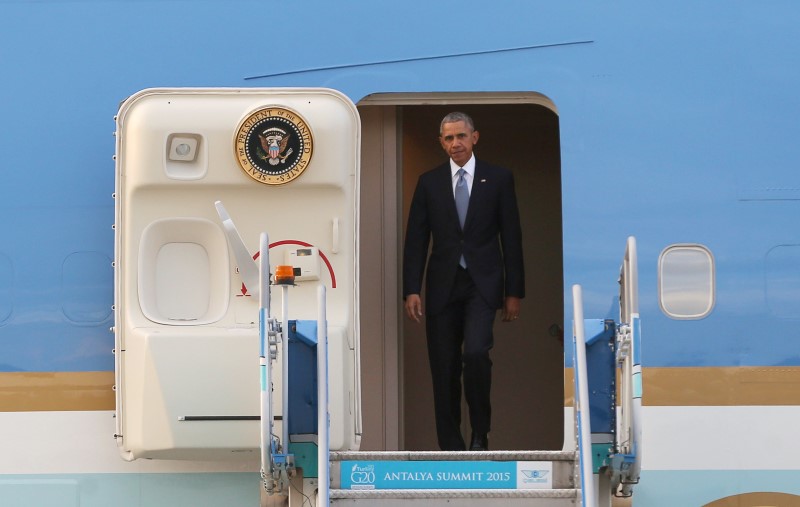By Asli Kandemir and Nick Tattersall
BELEK, Turkey (Reuters) - Turkish President Tayyip Erdogan urged world leaders on Saturday to prioritize the fight against terrorism as they gathered for a summit in southwestern Turkey, saying the Paris attacks claimed by Islamic State showed the time for words was now over.
The worst bloodshed in France since the end of World War Two cast a pall over preparations for the two-day summit of the Group of 20 major economies that begins on Sunday and is due to be attended by heads of state including U.S. President Barack Obama and Russian President Vladimir Putin.
French President Francois Hollande has pulled out of the meetings but told Erdogan by phone that his foreign and finance ministers would attend, Turkish presidential sources said.
At least 127 people were killed as bombers and gunmen went on a rampage across the French capital overnight, targeting a concert hall, restaurants, bars and a sports stadium.
"We are now at a point where words end in the fight against terrorism. We are now at a stage where this should be put at the forefront," Erdogan told reporters ahead of the summit, also due to be attended by leaders from Europe, China, Japan, Canada, Australia and Brazil, among others.
Although the G20 usually focuses on economic issues, the fight against terrorism was already expected to be on the agenda. The summit comes two weeks after a suspected bomb attack on a Russian airliner killed 224 people in the Sinai Peninsula.
It also comes just over a month after two suspected Islamic State suicide bombers blew themselves up at a peace rally in the Turkish capital Ankara, killing more than 100 people in the worst such attack in the country.
Events such as the attacks in Paris made it crucial for the world's top economies to stand shoulder to shoulder at the summit, China's vice finance minister said.
"We must work together, we must enhance our solidarity," Zhu Guangyou told a news conference in the coastal resort of Belek, where leaders began gathering for the summit.
Speaking in Vienna, Russian Foreign Minister Sergei Lavrov said there was growing consensus among global powers that they had to work together to confront Islamic State.
TURKEY'S BATTLES
The G20 summit takes place just 500 km (310 miles) from Syria, where a 4-1/2-year conflict has transformed Islamic State militants into a global security threat and spawned Europe's largest migration flows since World War Two.
Erdogan condemned the Paris killings and pointed to Turkey's own long battle with domestic security threats, which include its fight with Kurdistan Workers' Party (PKK) militants in its southeast and recent bomb attacks linked to Islamic State.
Ankara sees a growing threat to its security from radical Islamists. Security sources said the Turkish army killed four Islamic State militants when they came under attack from across the Syrian border on Saturday. One official said the frequency of such attacks was on the rise.
Turkish officials said Erdogan would push in bilateral meetings with leaders including Obama for more coordinated and decisive action against Islamic State in Syria.
But he would also emphasize Turkey's opposition to U.S. support for Kurdish rebels who are fighting the radical Sunni insurgents, they said. Turkey says these rebels have close ties to the PKK, considered a terrorist group by the United States and the European Union as well as by Ankara.
"Terrorism has no nationality or religion. All terrorism is bad, we must leave aside the feeling that our terrorist is bad and your terrorist is good," Erdogan said.
NATO-member Turkey opened its air bases in July to the U.S.-led coalition against Islamic State, but critics say it woke up late to the threat.
Following January's attacks in Paris by gunmen on the satirical magazine Charlie Hebdo, the wife of one of the gunmen fled through Turkey to IS-controlled Syria.
Turkey stepped up its fight against Islamic State in July, but the campaign has largely seen air strikes and military action against PKK fighters in Turkey and northern Iraq.
On Friday night Turkish jets pounded PKK targets in northern Iraq, where the group's headquarters are located.
Selahattin Demirtas, co-leader of Turkey's pro-Kurdish opposition HDP, said the Paris attacks were a result of the world's failure to deal with Islamic State (ISIL).

"The world, including Turkey, has not undertaken an effective, coordinated effort against ISIL. Just the opposite, everyone used ISIL, or elements within it, for their own interests," he said at an event in Istanbul.